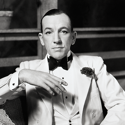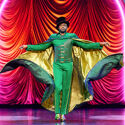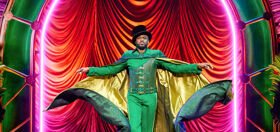Madonna celebrates her 60th birthday August 16.
From all the articles being posted, one would think the day will be a worldwide holiday. Madonna is being celebrated for her music, videos, fashion, photo shoots, and charity work among many other things. However, as big as Madonna’s other achievements are, they may well take a backseat to her most important achievement — her history-changing work for the LGBT community.
Let’s time travel back to March 21, 1989. I had just taken a social studies test that I didn’t study for the night before because I was too excited about buying Madonna’s new album Like a Prayer. I snuck out of school when Musicland opened up and saw the CD, which would be the very first one I would buy, at the checkout counter. I opened the package, took the plastic off the CD, and there was some flowery smell that made me sneeze. But that barely registered.
Related: Madonna Savages Donald Trump With Cover Of Britney Spears Toxic
How about we take this to the next level?
Our newsletter is like a refreshing cocktail (or mocktail) of LGBTQ+ entertainment and pop culture, served up with a side of eye-candy.
Surprisingly, a blue note dropped out, and it was titled “The Facts About AIDS.” I didn’t know much about the disease except that it was killing gay men, which our local priest, who would soon be convicted of child molestation, said was a “good thing.” A lot of other people agreed. I was a little uncomfortable with the note, especially since I was coming to terms with my own queerness. However, I read the whole thing, which talked about ways you can get AIDS and how to prevent getting infected.
This was early 1989 – a time when HIV and AIDS prevention wasn’t taught in schools. It wasn’t taught at home. Even my open-minded friends always threw the discussion under the rug. But Madonna didn’t. And I thank her for the fact that the album insert might have saved my life. That same year, she appeared unabashedly at an AIDS benefit with her gay dance teacher Christopher Flynn, who would soon succumb to the disease. Of course, AIDS wasn’t just a “gay disease,” but it brought terror on the LGBT community far more than others. And Madonna, the biggest star in the world at the time, took a huge risk by not only being an AIDS activist but loudly proclaiming her love for the LGBT community as well.
The following year, she released her dance anthem “Vogue,” which was inspired by the Harlem ball scene in the late 1980s. It involved mostly gay and trans women of color, which was highlighted in Ryan Murphy’s brilliant new series Pose, some thirty years later. Madonna has been accused of “cultural appropriation” for her work with Voguing by some who don’t understand the context of the time the song and video came out – a time when gay men, especially those of color, were demeaned by society in the same way Muslims and immigrants are demeaned today.
In any case, Madonna took a part of our culture and helped earn it mainstream acceptance. She was not only upfront about where she got it from, but took several dancers from the ball scene, had them choreograph the video, and put them on the world stage for her Blond Ambition World Tour. The 1991 film “Truth or Dare,” which documented the dancers and the tour, is largely seen as a groundbreaking film for the equality movement in that it presented gay men kissing, participating in parades, and largely just being themselves. The film was condemned as “satanic” by conservatives, but for us, it opened up a whole new world of gay culture, which was still heavily vilified in America and the rest of the world.
One year later, Madonna released the maligned book SEX and the album Erotica. Though the former still rings as an unnecessary career miscalculation to many, the album, which was also widely condemned, is presently was seen as a musical breakthrough. Some call it Madonna’s Lemonade, but that is far from the truth. No offense to Beyoncé, who has been groundbreaking all on her own, but Madonna operated in a world where the LGBT community was looked down on at best and attacked at worst.
Madonna’s work was followed by others in the entertainment industry. The show Roseanne had several positive LGBT characters with storylines accepted by its huge audience. In 1997, Ellen DeGeneres created “The Puppy Episode” for her show Ellen, which is seen as a key moment in the LGBT rights movement. In 2012, DeGeneres revealed that Madonna wrote her an inspiring letter that influenced her decision in going through with the history-changing television episode.
By 1998, we had Will & Grace as well as Sex and the City. In the 2000’s, Madonna’s work took a backseat after her marriage to Guy Ritchie, but her performances still dealt indirectly with her support of gay marriage and gays in the military. By the 2010s, it seemed every pop star marketed to LGBTQ, with some flirting publicly with a gay or bi identity even though they’d never actually dated someone of the same sex.
This past decade, Madonna gave an empowered speech about LGBT rights at a Russian concert despite death threats. She spoke out against the Boy Scout’s ban on gay leaders, which was eventually lifted. Some have accused her of “jumping on the bandwagon” and “exploiting the LGBT community.”
But for those who grew up in that cruel, hostile anti-gay world like me will always be thankful to Madonna for her brave stance, which helped me and a maligned LGBT generation to express itself when the rest of the world tried to shut it down.
Daryl Deino is a professional writer and SAG actor. He has written articles about pop culture and technology for sites such as HuffPost, ScreenRant, Yahoo News, and the New York Observer. He has also appeared in such television shows as The Untouchables, Parks and Recreation, Modern Family, and Two Broke Girls.



















misterjack
Great story.
Happy B-Day, Madonna!
Vince
I remember hearing like a prayer on the radio as I was on my way to san antonio basic training as a 19 yo kid. They were playing the eff out of it. The christian conservatives were predictably outraged. By the 90s she was huge. No singer will ever get that close to her celebrity nor her wealth as a billionaire now.
Vince
I wonder how instrumental her gay brother was. I know they were close back then. Catering to the gays is now taken for granted but was very shrewd business wise back then.
Thad
Happy birthday, Derek! Have a great day, however you choose!
Rob91316
A world without Madonna in it is not a world I want to live in.
djmcgamester
Wow, that’s amazing. What a wonderful thing Madonna did way back then.
Bunnco
Madonna saved a lot of LGBTQ lives back then. She was such a huge star and so supportive when it seemed no-one else was. It was the plague and to be gay was terrifiying. If you were old enough all of your friends were dying and how could you not think you’d be next? If you were young what kind of life were you destined to? There was no cure just death. Madonna brought hope, we weren’t alone, and she brought joy(and escape from the madness) in her music. ‘get into the groove boy you’ve got to prove your love to me’ …..we just came here to dance